Business Research: Organizational Citizenship Behavior Paradox Study
VerifiedAdded on 2023/06/14
|19
|4554
|131
Report
AI Summary
This report delves into the intricate relationship between Organizational Citizenship Behavior (OCB) and the managerial paradox it presents within organizations. It begins by defining OCB as discretionary actions by employees that go beyond their formal job descriptions, contributing positively to organizational success. The study acknowledges the benefits of OCB, such as increased job satisfaction, reduced absenteeism, and improved productivity. However, it also addresses the potential pitfalls, including workplace conflicts, unhealthy competition, and dependency syndrome. The report highlights the crucial role of managers in navigating this paradox by implementing strategies to mitigate the negative impacts of OCB while fostering a secure and conflict-free work environment. It emphasizes the need for managers to reflect on the strengths and weaknesses of OCB in organizational management practices and considers the impact and challenges of OCB, offering insights into necessary strategies for future prospects.
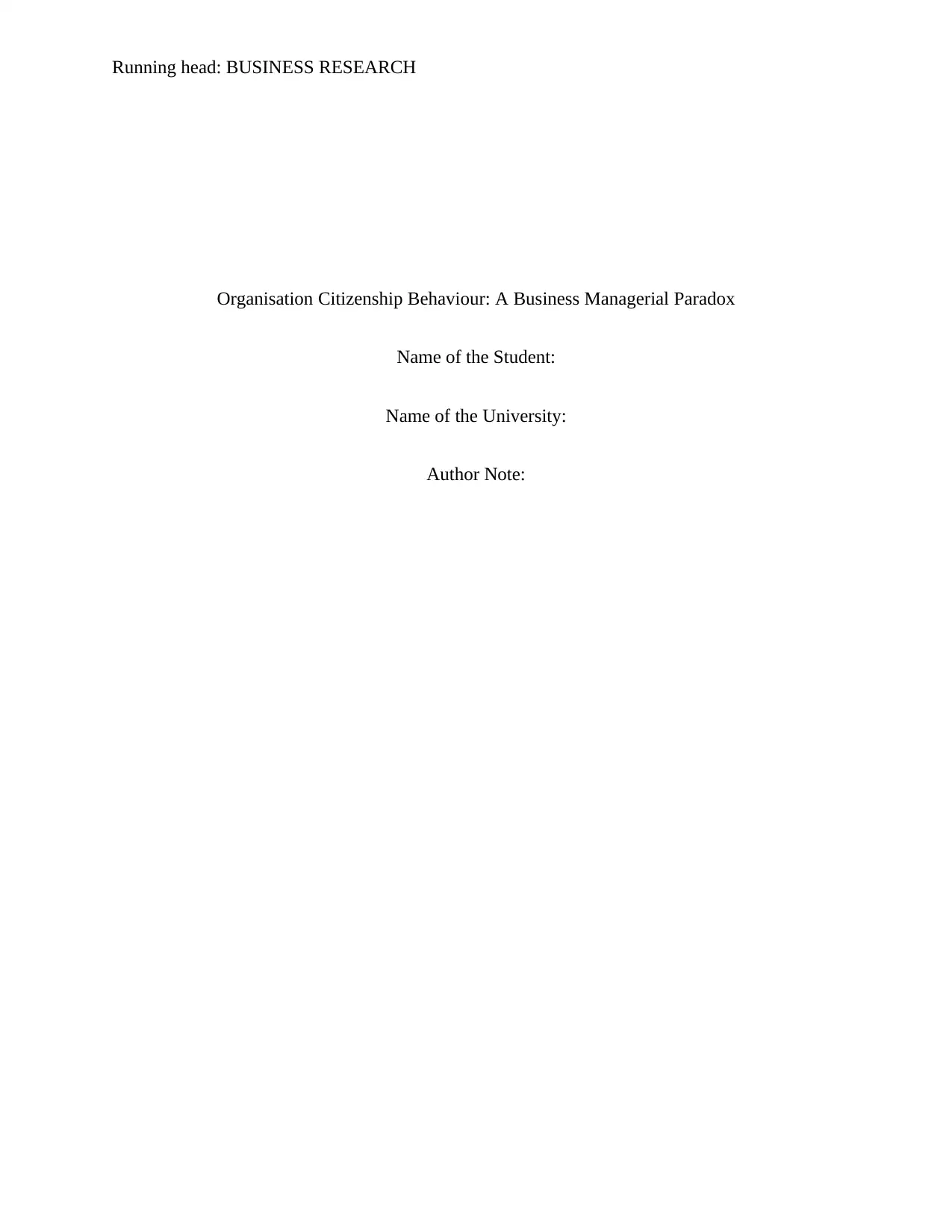
Running head: BUSINESS RESEARCH
Organisation Citizenship Behaviour: A Business Managerial Paradox
Name of the Student:
Name of the University:
Author Note:
Organisation Citizenship Behaviour: A Business Managerial Paradox
Name of the Student:
Name of the University:
Author Note:
Paraphrase This Document
Need a fresh take? Get an instant paraphrase of this document with our AI Paraphraser
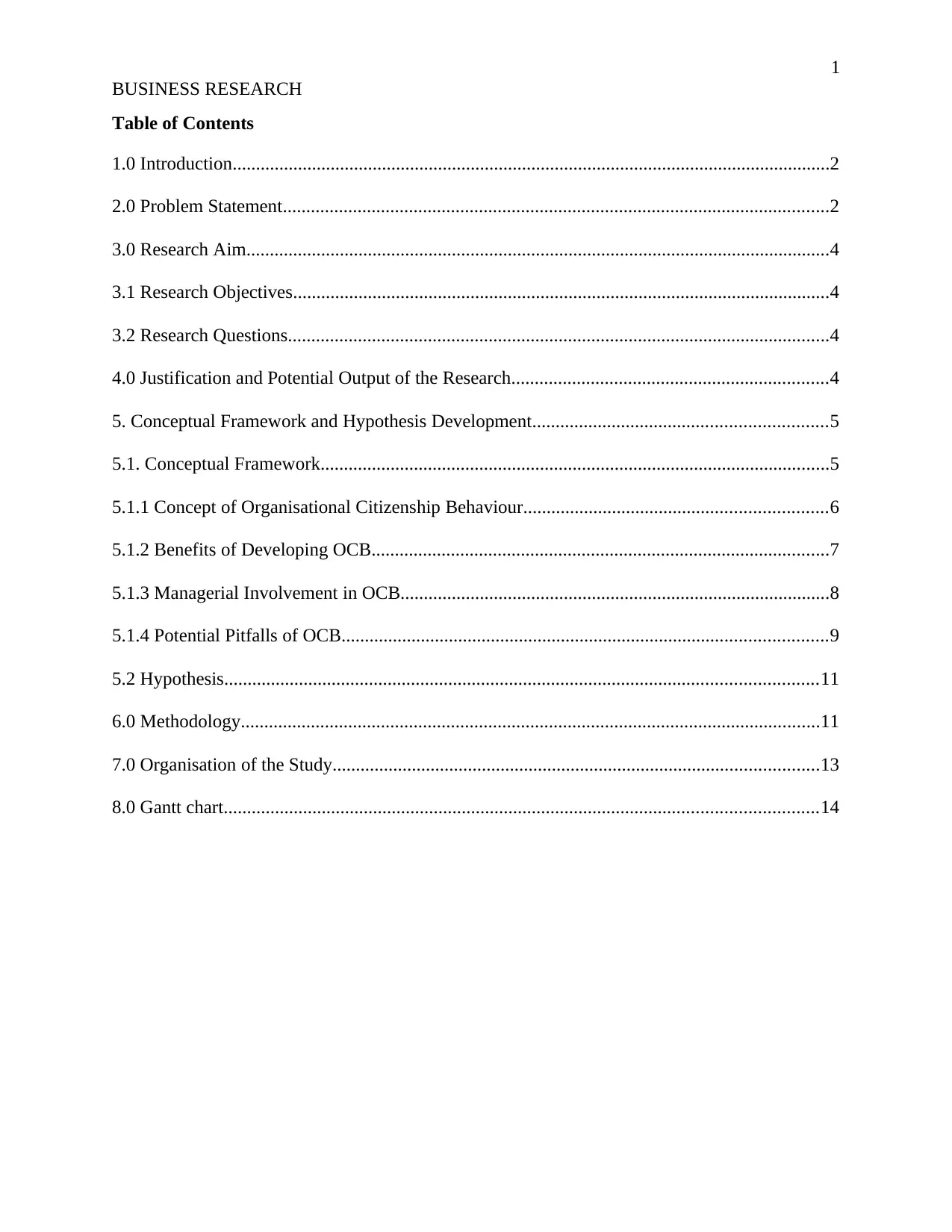
1
BUSINESS RESEARCH
Table of Contents
1.0 Introduction................................................................................................................................2
2.0 Problem Statement.....................................................................................................................2
3.0 Research Aim.............................................................................................................................4
3.1 Research Objectives...................................................................................................................4
3.2 Research Questions....................................................................................................................4
4.0 Justification and Potential Output of the Research....................................................................4
5. Conceptual Framework and Hypothesis Development...............................................................5
5.1. Conceptual Framework.............................................................................................................5
5.1.1 Concept of Organisational Citizenship Behaviour.................................................................6
5.1.2 Benefits of Developing OCB..................................................................................................7
5.1.3 Managerial Involvement in OCB............................................................................................8
5.1.4 Potential Pitfalls of OCB........................................................................................................9
5.2 Hypothesis...............................................................................................................................11
6.0 Methodology............................................................................................................................11
7.0 Organisation of the Study........................................................................................................13
8.0 Gantt chart...............................................................................................................................14
BUSINESS RESEARCH
Table of Contents
1.0 Introduction................................................................................................................................2
2.0 Problem Statement.....................................................................................................................2
3.0 Research Aim.............................................................................................................................4
3.1 Research Objectives...................................................................................................................4
3.2 Research Questions....................................................................................................................4
4.0 Justification and Potential Output of the Research....................................................................4
5. Conceptual Framework and Hypothesis Development...............................................................5
5.1. Conceptual Framework.............................................................................................................5
5.1.1 Concept of Organisational Citizenship Behaviour.................................................................6
5.1.2 Benefits of Developing OCB..................................................................................................7
5.1.3 Managerial Involvement in OCB............................................................................................8
5.1.4 Potential Pitfalls of OCB........................................................................................................9
5.2 Hypothesis...............................................................................................................................11
6.0 Methodology............................................................................................................................11
7.0 Organisation of the Study........................................................................................................13
8.0 Gantt chart...............................................................................................................................14
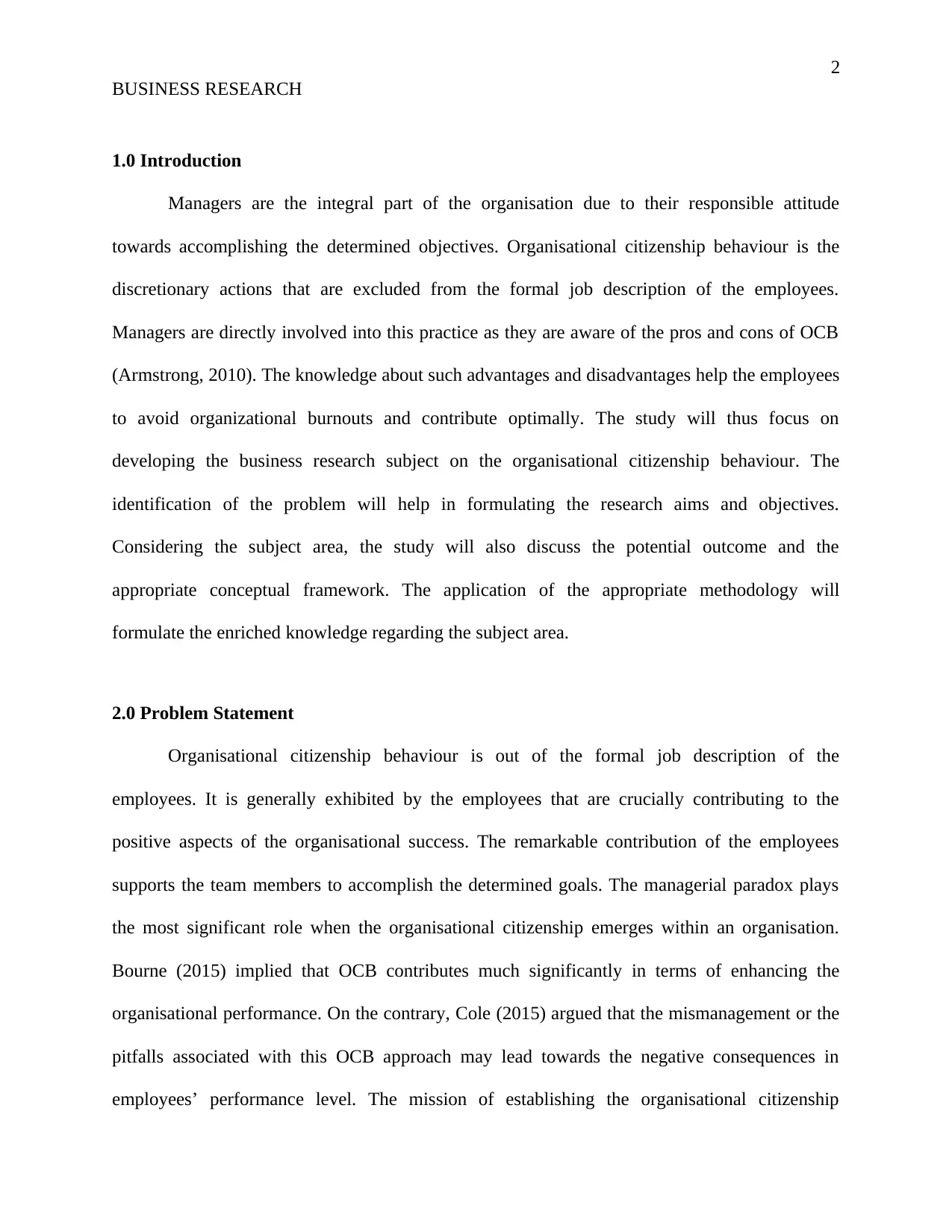
2
BUSINESS RESEARCH
1.0 Introduction
Managers are the integral part of the organisation due to their responsible attitude
towards accomplishing the determined objectives. Organisational citizenship behaviour is the
discretionary actions that are excluded from the formal job description of the employees.
Managers are directly involved into this practice as they are aware of the pros and cons of OCB
(Armstrong, 2010). The knowledge about such advantages and disadvantages help the employees
to avoid organizational burnouts and contribute optimally. The study will thus focus on
developing the business research subject on the organisational citizenship behaviour. The
identification of the problem will help in formulating the research aims and objectives.
Considering the subject area, the study will also discuss the potential outcome and the
appropriate conceptual framework. The application of the appropriate methodology will
formulate the enriched knowledge regarding the subject area.
2.0 Problem Statement
Organisational citizenship behaviour is out of the formal job description of the
employees. It is generally exhibited by the employees that are crucially contributing to the
positive aspects of the organisational success. The remarkable contribution of the employees
supports the team members to accomplish the determined goals. The managerial paradox plays
the most significant role when the organisational citizenship emerges within an organisation.
Bourne (2015) implied that OCB contributes much significantly in terms of enhancing the
organisational performance. On the contrary, Cole (2015) argued that the mismanagement or the
pitfalls associated with this OCB approach may lead towards the negative consequences in
employees’ performance level. The mission of establishing the organisational citizenship
BUSINESS RESEARCH
1.0 Introduction
Managers are the integral part of the organisation due to their responsible attitude
towards accomplishing the determined objectives. Organisational citizenship behaviour is the
discretionary actions that are excluded from the formal job description of the employees.
Managers are directly involved into this practice as they are aware of the pros and cons of OCB
(Armstrong, 2010). The knowledge about such advantages and disadvantages help the employees
to avoid organizational burnouts and contribute optimally. The study will thus focus on
developing the business research subject on the organisational citizenship behaviour. The
identification of the problem will help in formulating the research aims and objectives.
Considering the subject area, the study will also discuss the potential outcome and the
appropriate conceptual framework. The application of the appropriate methodology will
formulate the enriched knowledge regarding the subject area.
2.0 Problem Statement
Organisational citizenship behaviour is out of the formal job description of the
employees. It is generally exhibited by the employees that are crucially contributing to the
positive aspects of the organisational success. The remarkable contribution of the employees
supports the team members to accomplish the determined goals. The managerial paradox plays
the most significant role when the organisational citizenship emerges within an organisation.
Bourne (2015) implied that OCB contributes much significantly in terms of enhancing the
organisational performance. On the contrary, Cole (2015) argued that the mismanagement or the
pitfalls associated with this OCB approach may lead towards the negative consequences in
employees’ performance level. The mission of establishing the organisational citizenship
⊘ This is a preview!⊘
Do you want full access?
Subscribe today to unlock all pages.

Trusted by 1+ million students worldwide
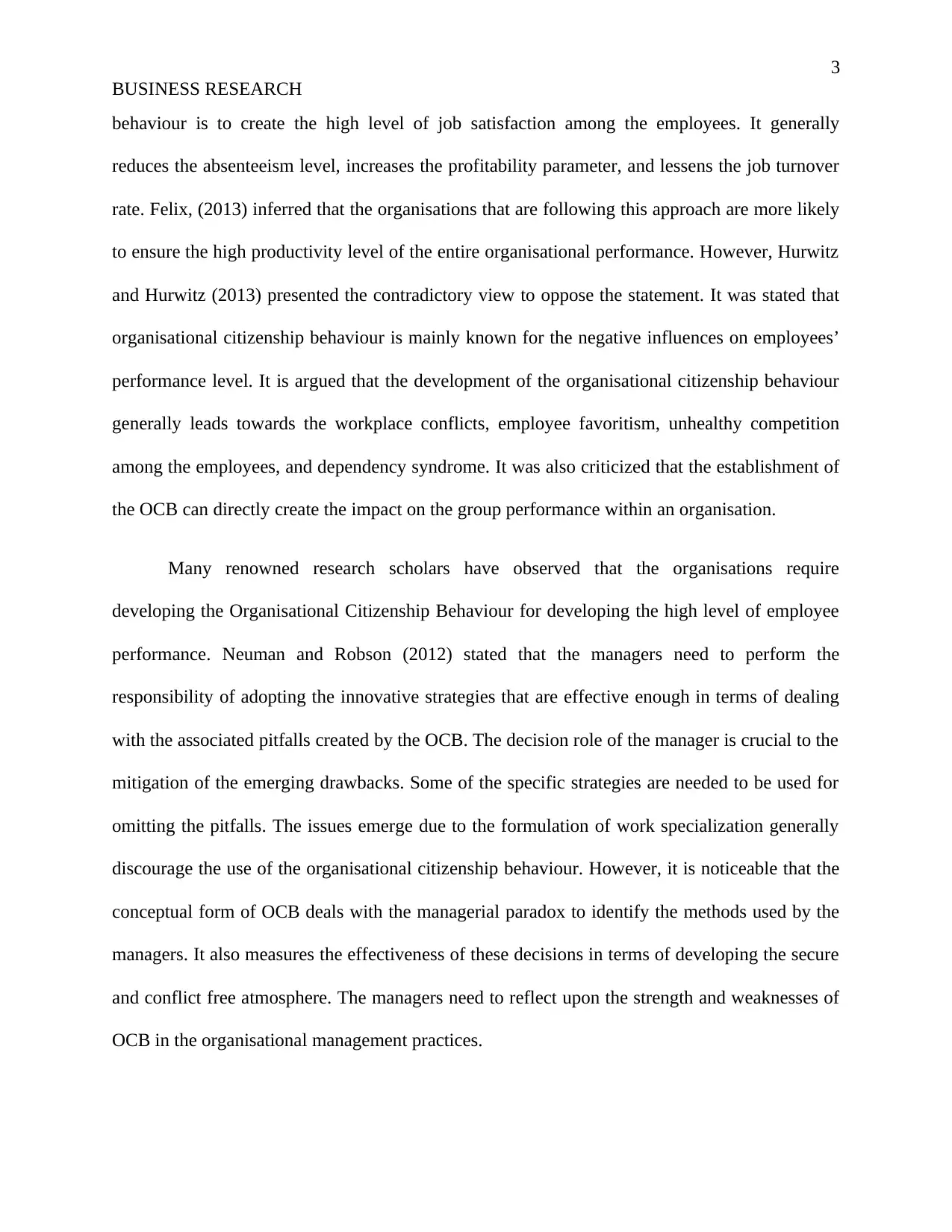
3
BUSINESS RESEARCH
behaviour is to create the high level of job satisfaction among the employees. It generally
reduces the absenteeism level, increases the profitability parameter, and lessens the job turnover
rate. Felix, (2013) inferred that the organisations that are following this approach are more likely
to ensure the high productivity level of the entire organisational performance. However, Hurwitz
and Hurwitz (2013) presented the contradictory view to oppose the statement. It was stated that
organisational citizenship behaviour is mainly known for the negative influences on employees’
performance level. It is argued that the development of the organisational citizenship behaviour
generally leads towards the workplace conflicts, employee favoritism, unhealthy competition
among the employees, and dependency syndrome. It was also criticized that the establishment of
the OCB can directly create the impact on the group performance within an organisation.
Many renowned research scholars have observed that the organisations require
developing the Organisational Citizenship Behaviour for developing the high level of employee
performance. Neuman and Robson (2012) stated that the managers need to perform the
responsibility of adopting the innovative strategies that are effective enough in terms of dealing
with the associated pitfalls created by the OCB. The decision role of the manager is crucial to the
mitigation of the emerging drawbacks. Some of the specific strategies are needed to be used for
omitting the pitfalls. The issues emerge due to the formulation of work specialization generally
discourage the use of the organisational citizenship behaviour. However, it is noticeable that the
conceptual form of OCB deals with the managerial paradox to identify the methods used by the
managers. It also measures the effectiveness of these decisions in terms of developing the secure
and conflict free atmosphere. The managers need to reflect upon the strength and weaknesses of
OCB in the organisational management practices.
BUSINESS RESEARCH
behaviour is to create the high level of job satisfaction among the employees. It generally
reduces the absenteeism level, increases the profitability parameter, and lessens the job turnover
rate. Felix, (2013) inferred that the organisations that are following this approach are more likely
to ensure the high productivity level of the entire organisational performance. However, Hurwitz
and Hurwitz (2013) presented the contradictory view to oppose the statement. It was stated that
organisational citizenship behaviour is mainly known for the negative influences on employees’
performance level. It is argued that the development of the organisational citizenship behaviour
generally leads towards the workplace conflicts, employee favoritism, unhealthy competition
among the employees, and dependency syndrome. It was also criticized that the establishment of
the OCB can directly create the impact on the group performance within an organisation.
Many renowned research scholars have observed that the organisations require
developing the Organisational Citizenship Behaviour for developing the high level of employee
performance. Neuman and Robson (2012) stated that the managers need to perform the
responsibility of adopting the innovative strategies that are effective enough in terms of dealing
with the associated pitfalls created by the OCB. The decision role of the manager is crucial to the
mitigation of the emerging drawbacks. Some of the specific strategies are needed to be used for
omitting the pitfalls. The issues emerge due to the formulation of work specialization generally
discourage the use of the organisational citizenship behaviour. However, it is noticeable that the
conceptual form of OCB deals with the managerial paradox to identify the methods used by the
managers. It also measures the effectiveness of these decisions in terms of developing the secure
and conflict free atmosphere. The managers need to reflect upon the strength and weaknesses of
OCB in the organisational management practices.
Paraphrase This Document
Need a fresh take? Get an instant paraphrase of this document with our AI Paraphraser
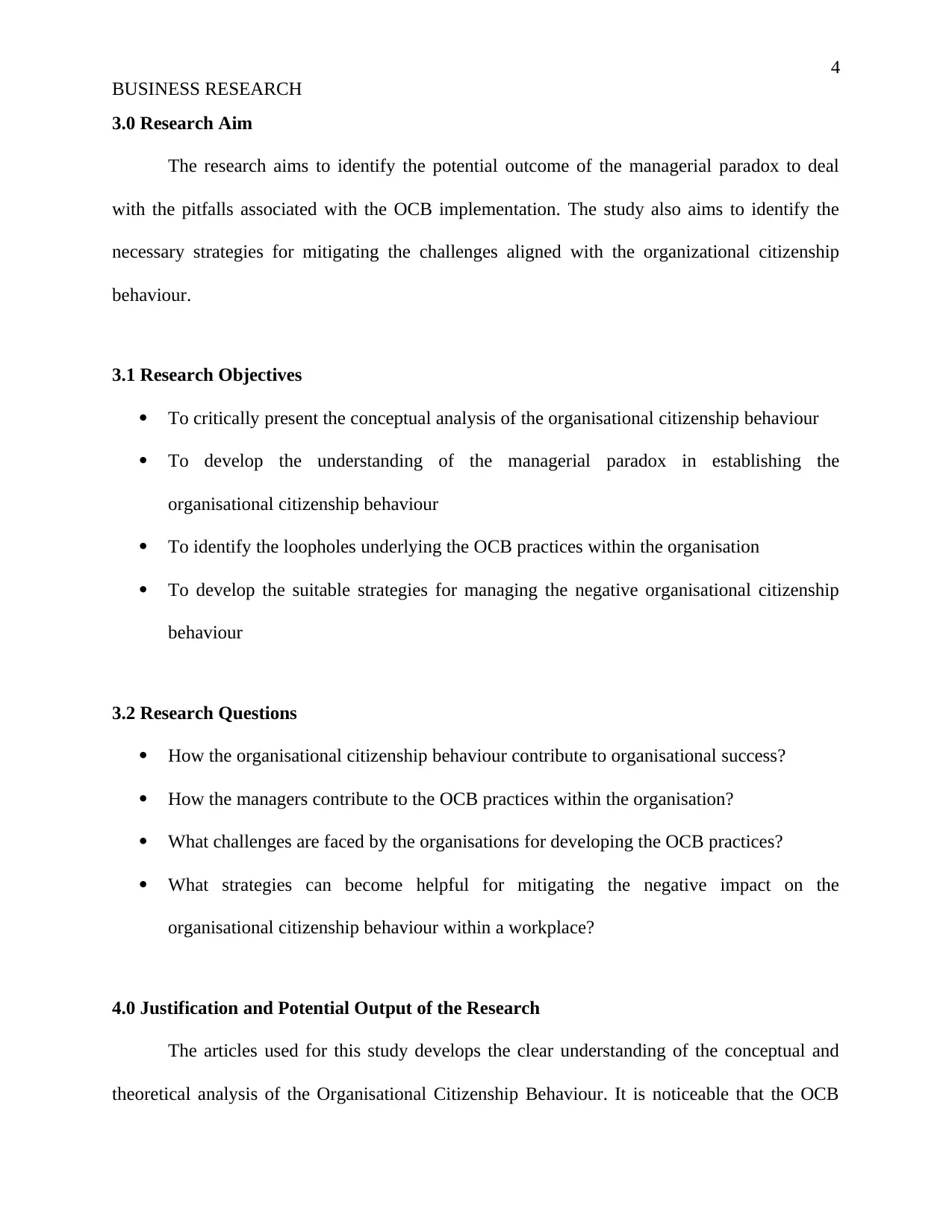
4
BUSINESS RESEARCH
3.0 Research Aim
The research aims to identify the potential outcome of the managerial paradox to deal
with the pitfalls associated with the OCB implementation. The study also aims to identify the
necessary strategies for mitigating the challenges aligned with the organizational citizenship
behaviour.
3.1 Research Objectives
To critically present the conceptual analysis of the organisational citizenship behaviour
To develop the understanding of the managerial paradox in establishing the
organisational citizenship behaviour
To identify the loopholes underlying the OCB practices within the organisation
To develop the suitable strategies for managing the negative organisational citizenship
behaviour
3.2 Research Questions
How the organisational citizenship behaviour contribute to organisational success?
How the managers contribute to the OCB practices within the organisation?
What challenges are faced by the organisations for developing the OCB practices?
What strategies can become helpful for mitigating the negative impact on the
organisational citizenship behaviour within a workplace?
4.0 Justification and Potential Output of the Research
The articles used for this study develops the clear understanding of the conceptual and
theoretical analysis of the Organisational Citizenship Behaviour. It is noticeable that the OCB
BUSINESS RESEARCH
3.0 Research Aim
The research aims to identify the potential outcome of the managerial paradox to deal
with the pitfalls associated with the OCB implementation. The study also aims to identify the
necessary strategies for mitigating the challenges aligned with the organizational citizenship
behaviour.
3.1 Research Objectives
To critically present the conceptual analysis of the organisational citizenship behaviour
To develop the understanding of the managerial paradox in establishing the
organisational citizenship behaviour
To identify the loopholes underlying the OCB practices within the organisation
To develop the suitable strategies for managing the negative organisational citizenship
behaviour
3.2 Research Questions
How the organisational citizenship behaviour contribute to organisational success?
How the managers contribute to the OCB practices within the organisation?
What challenges are faced by the organisations for developing the OCB practices?
What strategies can become helpful for mitigating the negative impact on the
organisational citizenship behaviour within a workplace?
4.0 Justification and Potential Output of the Research
The articles used for this study develops the clear understanding of the conceptual and
theoretical analysis of the Organisational Citizenship Behaviour. It is noticeable that the OCB
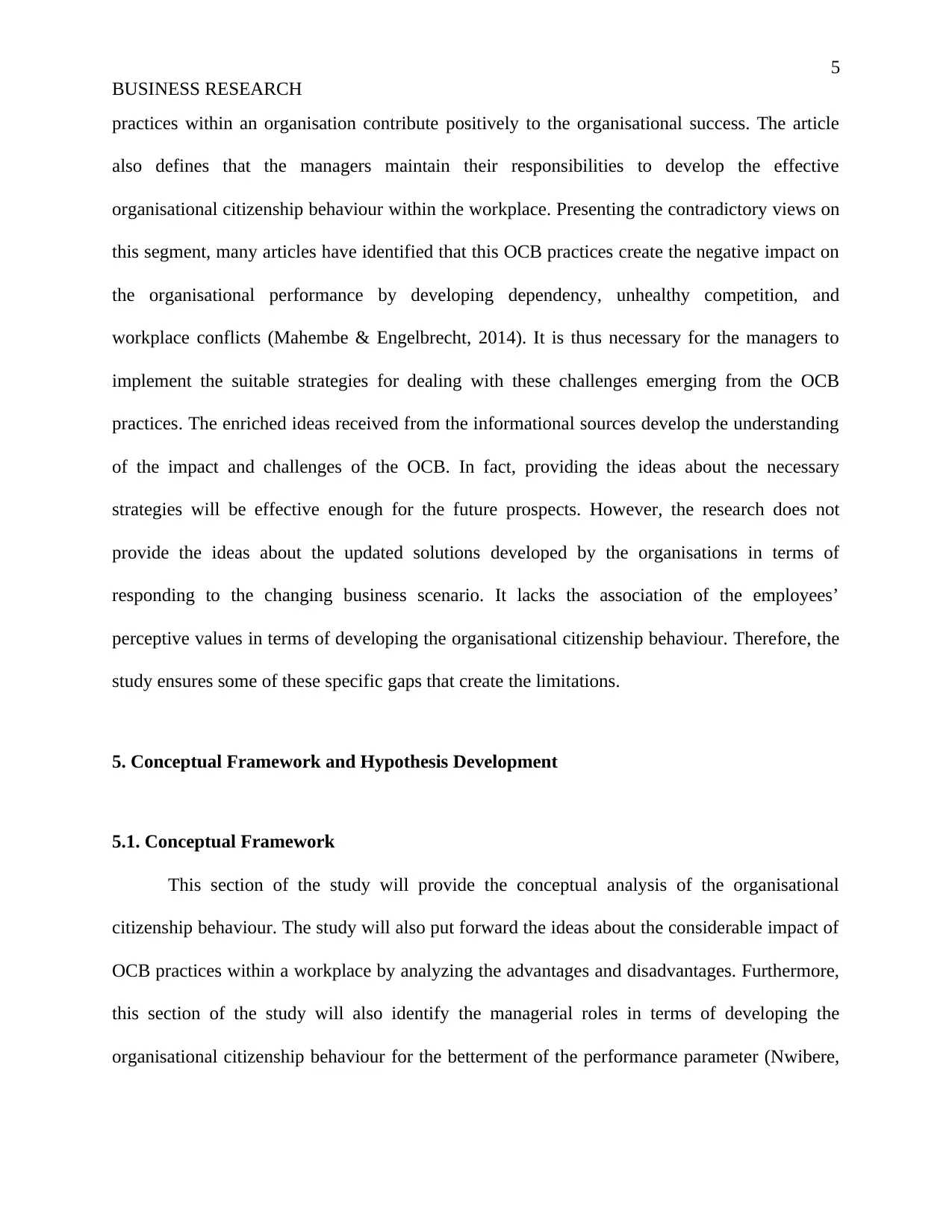
5
BUSINESS RESEARCH
practices within an organisation contribute positively to the organisational success. The article
also defines that the managers maintain their responsibilities to develop the effective
organisational citizenship behaviour within the workplace. Presenting the contradictory views on
this segment, many articles have identified that this OCB practices create the negative impact on
the organisational performance by developing dependency, unhealthy competition, and
workplace conflicts (Mahembe & Engelbrecht, 2014). It is thus necessary for the managers to
implement the suitable strategies for dealing with these challenges emerging from the OCB
practices. The enriched ideas received from the informational sources develop the understanding
of the impact and challenges of the OCB. In fact, providing the ideas about the necessary
strategies will be effective enough for the future prospects. However, the research does not
provide the ideas about the updated solutions developed by the organisations in terms of
responding to the changing business scenario. It lacks the association of the employees’
perceptive values in terms of developing the organisational citizenship behaviour. Therefore, the
study ensures some of these specific gaps that create the limitations.
5. Conceptual Framework and Hypothesis Development
5.1. Conceptual Framework
This section of the study will provide the conceptual analysis of the organisational
citizenship behaviour. The study will also put forward the ideas about the considerable impact of
OCB practices within a workplace by analyzing the advantages and disadvantages. Furthermore,
this section of the study will also identify the managerial roles in terms of developing the
organisational citizenship behaviour for the betterment of the performance parameter (Nwibere,
BUSINESS RESEARCH
practices within an organisation contribute positively to the organisational success. The article
also defines that the managers maintain their responsibilities to develop the effective
organisational citizenship behaviour within the workplace. Presenting the contradictory views on
this segment, many articles have identified that this OCB practices create the negative impact on
the organisational performance by developing dependency, unhealthy competition, and
workplace conflicts (Mahembe & Engelbrecht, 2014). It is thus necessary for the managers to
implement the suitable strategies for dealing with these challenges emerging from the OCB
practices. The enriched ideas received from the informational sources develop the understanding
of the impact and challenges of the OCB. In fact, providing the ideas about the necessary
strategies will be effective enough for the future prospects. However, the research does not
provide the ideas about the updated solutions developed by the organisations in terms of
responding to the changing business scenario. It lacks the association of the employees’
perceptive values in terms of developing the organisational citizenship behaviour. Therefore, the
study ensures some of these specific gaps that create the limitations.
5. Conceptual Framework and Hypothesis Development
5.1. Conceptual Framework
This section of the study will provide the conceptual analysis of the organisational
citizenship behaviour. The study will also put forward the ideas about the considerable impact of
OCB practices within a workplace by analyzing the advantages and disadvantages. Furthermore,
this section of the study will also identify the managerial roles in terms of developing the
organisational citizenship behaviour for the betterment of the performance parameter (Nwibere,
⊘ This is a preview!⊘
Do you want full access?
Subscribe today to unlock all pages.

Trusted by 1+ million students worldwide
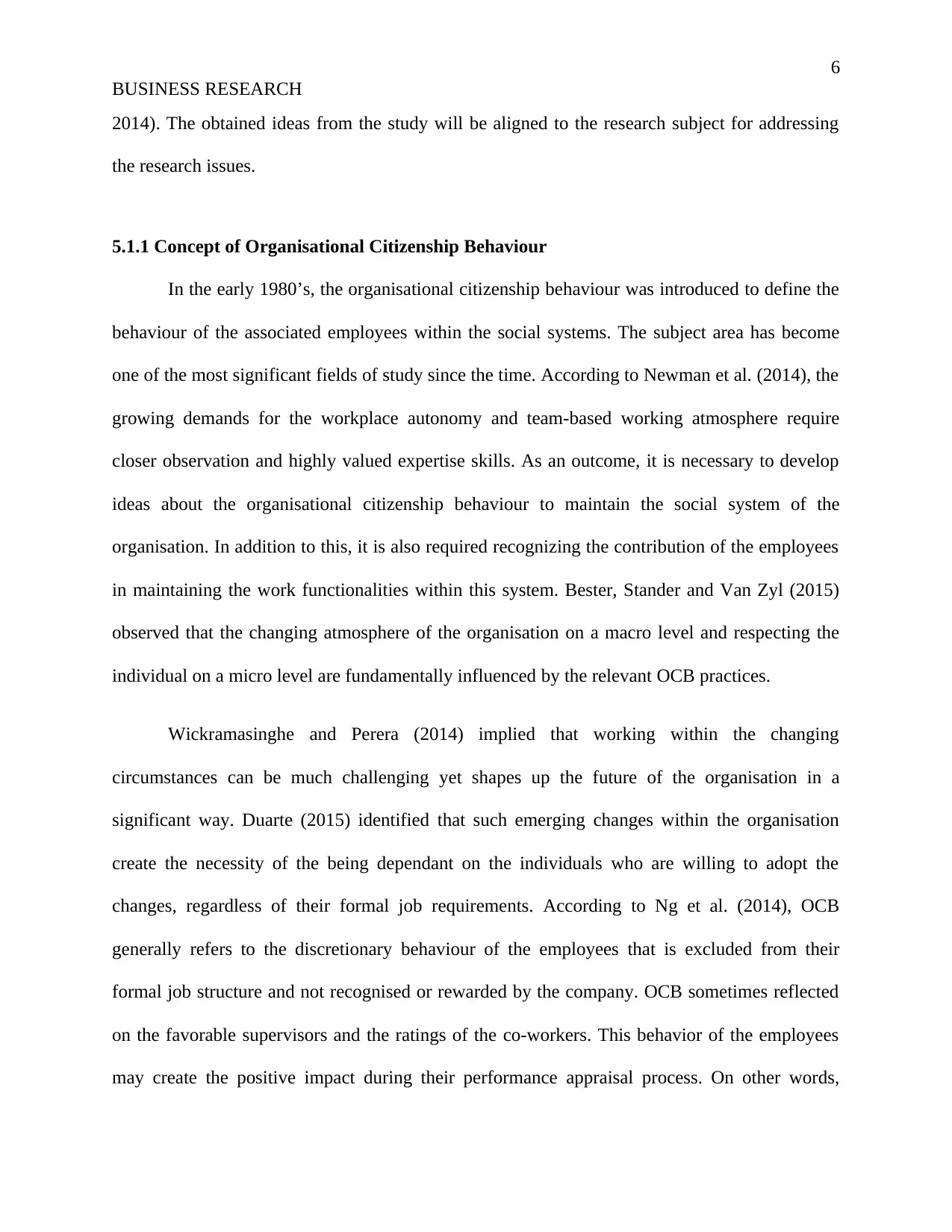
6
BUSINESS RESEARCH
2014). The obtained ideas from the study will be aligned to the research subject for addressing
the research issues.
5.1.1 Concept of Organisational Citizenship Behaviour
In the early 1980’s, the organisational citizenship behaviour was introduced to define the
behaviour of the associated employees within the social systems. The subject area has become
one of the most significant fields of study since the time. According to Newman et al. (2014), the
growing demands for the workplace autonomy and team-based working atmosphere require
closer observation and highly valued expertise skills. As an outcome, it is necessary to develop
ideas about the organisational citizenship behaviour to maintain the social system of the
organisation. In addition to this, it is also required recognizing the contribution of the employees
in maintaining the work functionalities within this system. Bester, Stander and Van Zyl (2015)
observed that the changing atmosphere of the organisation on a macro level and respecting the
individual on a micro level are fundamentally influenced by the relevant OCB practices.
Wickramasinghe and Perera (2014) implied that working within the changing
circumstances can be much challenging yet shapes up the future of the organisation in a
significant way. Duarte (2015) identified that such emerging changes within the organisation
create the necessity of the being dependant on the individuals who are willing to adopt the
changes, regardless of their formal job requirements. According to Ng et al. (2014), OCB
generally refers to the discretionary behaviour of the employees that is excluded from their
formal job structure and not recognised or rewarded by the company. OCB sometimes reflected
on the favorable supervisors and the ratings of the co-workers. This behavior of the employees
may create the positive impact during their performance appraisal process. On other words,
BUSINESS RESEARCH
2014). The obtained ideas from the study will be aligned to the research subject for addressing
the research issues.
5.1.1 Concept of Organisational Citizenship Behaviour
In the early 1980’s, the organisational citizenship behaviour was introduced to define the
behaviour of the associated employees within the social systems. The subject area has become
one of the most significant fields of study since the time. According to Newman et al. (2014), the
growing demands for the workplace autonomy and team-based working atmosphere require
closer observation and highly valued expertise skills. As an outcome, it is necessary to develop
ideas about the organisational citizenship behaviour to maintain the social system of the
organisation. In addition to this, it is also required recognizing the contribution of the employees
in maintaining the work functionalities within this system. Bester, Stander and Van Zyl (2015)
observed that the changing atmosphere of the organisation on a macro level and respecting the
individual on a micro level are fundamentally influenced by the relevant OCB practices.
Wickramasinghe and Perera (2014) implied that working within the changing
circumstances can be much challenging yet shapes up the future of the organisation in a
significant way. Duarte (2015) identified that such emerging changes within the organisation
create the necessity of the being dependant on the individuals who are willing to adopt the
changes, regardless of their formal job requirements. According to Ng et al. (2014), OCB
generally refers to the discretionary behaviour of the employees that is excluded from their
formal job structure and not recognised or rewarded by the company. OCB sometimes reflected
on the favorable supervisors and the ratings of the co-workers. This behavior of the employees
may create the positive impact during their performance appraisal process. On other words,
Paraphrase This Document
Need a fresh take? Get an instant paraphrase of this document with our AI Paraphraser
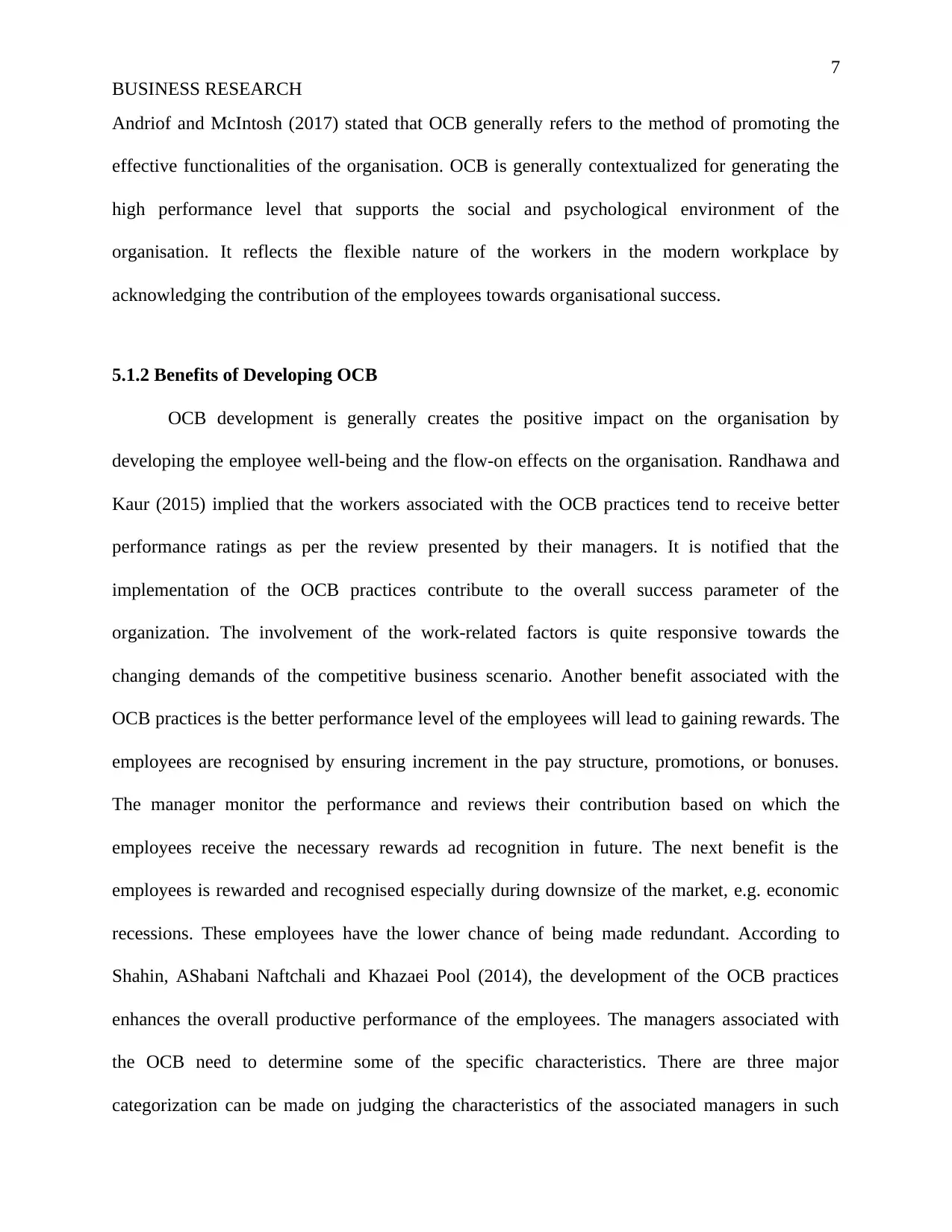
7
BUSINESS RESEARCH
Andriof and McIntosh (2017) stated that OCB generally refers to the method of promoting the
effective functionalities of the organisation. OCB is generally contextualized for generating the
high performance level that supports the social and psychological environment of the
organisation. It reflects the flexible nature of the workers in the modern workplace by
acknowledging the contribution of the employees towards organisational success.
5.1.2 Benefits of Developing OCB
OCB development is generally creates the positive impact on the organisation by
developing the employee well-being and the flow-on effects on the organisation. Randhawa and
Kaur (2015) implied that the workers associated with the OCB practices tend to receive better
performance ratings as per the review presented by their managers. It is notified that the
implementation of the OCB practices contribute to the overall success parameter of the
organization. The involvement of the work-related factors is quite responsive towards the
changing demands of the competitive business scenario. Another benefit associated with the
OCB practices is the better performance level of the employees will lead to gaining rewards. The
employees are recognised by ensuring increment in the pay structure, promotions, or bonuses.
The manager monitor the performance and reviews their contribution based on which the
employees receive the necessary rewards ad recognition in future. The next benefit is the
employees is rewarded and recognised especially during downsize of the market, e.g. economic
recessions. These employees have the lower chance of being made redundant. According to
Shahin, AShabani Naftchali and Khazaei Pool (2014), the development of the OCB practices
enhances the overall productive performance of the employees. The managers associated with
the OCB need to determine some of the specific characteristics. There are three major
categorization can be made on judging the characteristics of the associated managers in such
BUSINESS RESEARCH
Andriof and McIntosh (2017) stated that OCB generally refers to the method of promoting the
effective functionalities of the organisation. OCB is generally contextualized for generating the
high performance level that supports the social and psychological environment of the
organisation. It reflects the flexible nature of the workers in the modern workplace by
acknowledging the contribution of the employees towards organisational success.
5.1.2 Benefits of Developing OCB
OCB development is generally creates the positive impact on the organisation by
developing the employee well-being and the flow-on effects on the organisation. Randhawa and
Kaur (2015) implied that the workers associated with the OCB practices tend to receive better
performance ratings as per the review presented by their managers. It is notified that the
implementation of the OCB practices contribute to the overall success parameter of the
organization. The involvement of the work-related factors is quite responsive towards the
changing demands of the competitive business scenario. Another benefit associated with the
OCB practices is the better performance level of the employees will lead to gaining rewards. The
employees are recognised by ensuring increment in the pay structure, promotions, or bonuses.
The manager monitor the performance and reviews their contribution based on which the
employees receive the necessary rewards ad recognition in future. The next benefit is the
employees is rewarded and recognised especially during downsize of the market, e.g. economic
recessions. These employees have the lower chance of being made redundant. According to
Shahin, AShabani Naftchali and Khazaei Pool (2014), the development of the OCB practices
enhances the overall productive performance of the employees. The managers associated with
the OCB need to determine some of the specific characteristics. There are three major
categorization can be made on judging the characteristics of the associated managers in such
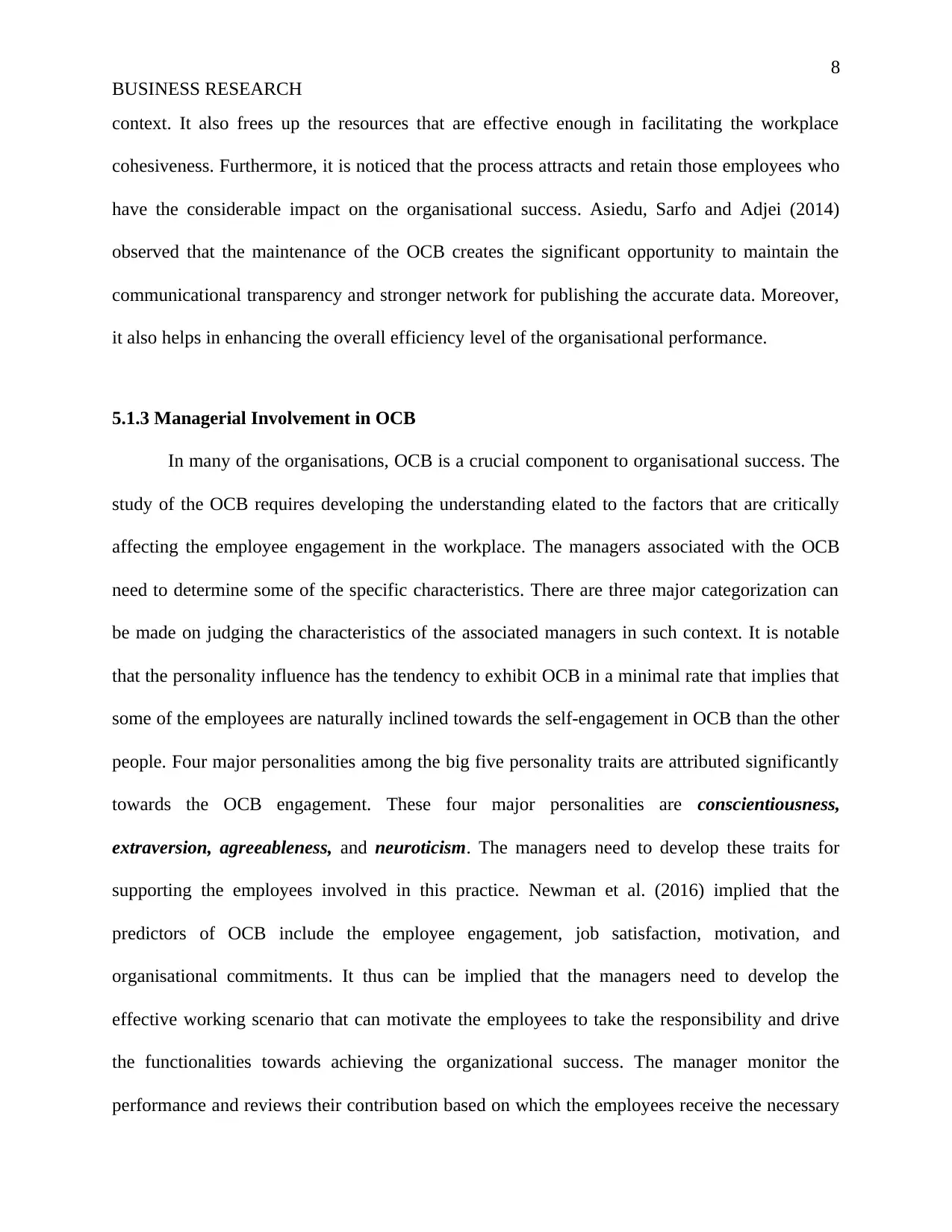
8
BUSINESS RESEARCH
context. It also frees up the resources that are effective enough in facilitating the workplace
cohesiveness. Furthermore, it is noticed that the process attracts and retain those employees who
have the considerable impact on the organisational success. Asiedu, Sarfo and Adjei (2014)
observed that the maintenance of the OCB creates the significant opportunity to maintain the
communicational transparency and stronger network for publishing the accurate data. Moreover,
it also helps in enhancing the overall efficiency level of the organisational performance.
5.1.3 Managerial Involvement in OCB
In many of the organisations, OCB is a crucial component to organisational success. The
study of the OCB requires developing the understanding elated to the factors that are critically
affecting the employee engagement in the workplace. The managers associated with the OCB
need to determine some of the specific characteristics. There are three major categorization can
be made on judging the characteristics of the associated managers in such context. It is notable
that the personality influence has the tendency to exhibit OCB in a minimal rate that implies that
some of the employees are naturally inclined towards the self-engagement in OCB than the other
people. Four major personalities among the big five personality traits are attributed significantly
towards the OCB engagement. These four major personalities are conscientiousness,
extraversion, agreeableness, and neuroticism. The managers need to develop these traits for
supporting the employees involved in this practice. Newman et al. (2016) implied that the
predictors of OCB include the employee engagement, job satisfaction, motivation, and
organisational commitments. It thus can be implied that the managers need to develop the
effective working scenario that can motivate the employees to take the responsibility and drive
the functionalities towards achieving the organizational success. The manager monitor the
performance and reviews their contribution based on which the employees receive the necessary
BUSINESS RESEARCH
context. It also frees up the resources that are effective enough in facilitating the workplace
cohesiveness. Furthermore, it is noticed that the process attracts and retain those employees who
have the considerable impact on the organisational success. Asiedu, Sarfo and Adjei (2014)
observed that the maintenance of the OCB creates the significant opportunity to maintain the
communicational transparency and stronger network for publishing the accurate data. Moreover,
it also helps in enhancing the overall efficiency level of the organisational performance.
5.1.3 Managerial Involvement in OCB
In many of the organisations, OCB is a crucial component to organisational success. The
study of the OCB requires developing the understanding elated to the factors that are critically
affecting the employee engagement in the workplace. The managers associated with the OCB
need to determine some of the specific characteristics. There are three major categorization can
be made on judging the characteristics of the associated managers in such context. It is notable
that the personality influence has the tendency to exhibit OCB in a minimal rate that implies that
some of the employees are naturally inclined towards the self-engagement in OCB than the other
people. Four major personalities among the big five personality traits are attributed significantly
towards the OCB engagement. These four major personalities are conscientiousness,
extraversion, agreeableness, and neuroticism. The managers need to develop these traits for
supporting the employees involved in this practice. Newman et al. (2016) implied that the
predictors of OCB include the employee engagement, job satisfaction, motivation, and
organisational commitments. It thus can be implied that the managers need to develop the
effective working scenario that can motivate the employees to take the responsibility and drive
the functionalities towards achieving the organizational success. The manager monitor the
performance and reviews their contribution based on which the employees receive the necessary
⊘ This is a preview!⊘
Do you want full access?
Subscribe today to unlock all pages.

Trusted by 1+ million students worldwide
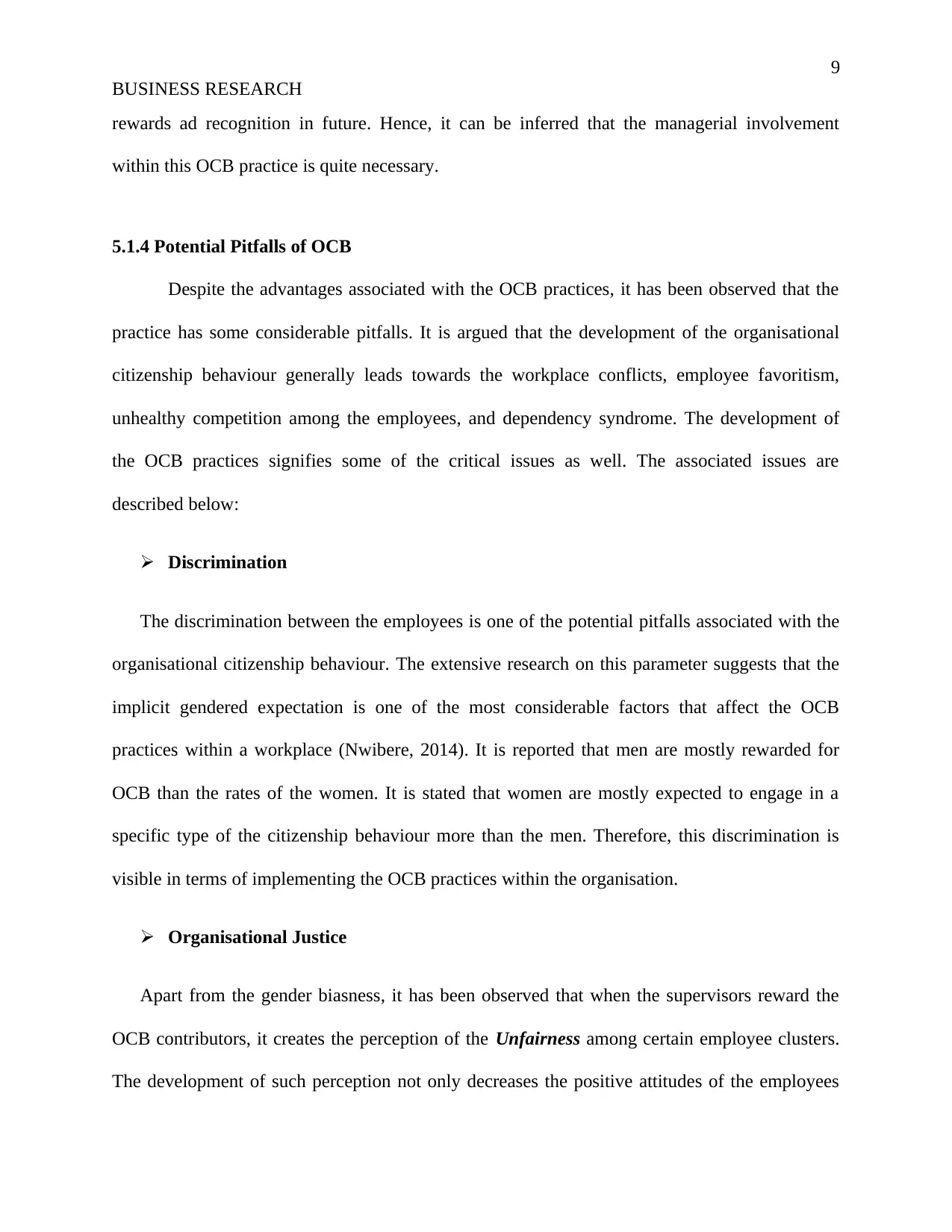
9
BUSINESS RESEARCH
rewards ad recognition in future. Hence, it can be inferred that the managerial involvement
within this OCB practice is quite necessary.
5.1.4 Potential Pitfalls of OCB
Despite the advantages associated with the OCB practices, it has been observed that the
practice has some considerable pitfalls. It is argued that the development of the organisational
citizenship behaviour generally leads towards the workplace conflicts, employee favoritism,
unhealthy competition among the employees, and dependency syndrome. The development of
the OCB practices signifies some of the critical issues as well. The associated issues are
described below:
Discrimination
The discrimination between the employees is one of the potential pitfalls associated with the
organisational citizenship behaviour. The extensive research on this parameter suggests that the
implicit gendered expectation is one of the most considerable factors that affect the OCB
practices within a workplace (Nwibere, 2014). It is reported that men are mostly rewarded for
OCB than the rates of the women. It is stated that women are mostly expected to engage in a
specific type of the citizenship behaviour more than the men. Therefore, this discrimination is
visible in terms of implementing the OCB practices within the organisation.
Organisational Justice
Apart from the gender biasness, it has been observed that when the supervisors reward the
OCB contributors, it creates the perception of the Unfairness among certain employee clusters.
The development of such perception not only decreases the positive attitudes of the employees
BUSINESS RESEARCH
rewards ad recognition in future. Hence, it can be inferred that the managerial involvement
within this OCB practice is quite necessary.
5.1.4 Potential Pitfalls of OCB
Despite the advantages associated with the OCB practices, it has been observed that the
practice has some considerable pitfalls. It is argued that the development of the organisational
citizenship behaviour generally leads towards the workplace conflicts, employee favoritism,
unhealthy competition among the employees, and dependency syndrome. The development of
the OCB practices signifies some of the critical issues as well. The associated issues are
described below:
Discrimination
The discrimination between the employees is one of the potential pitfalls associated with the
organisational citizenship behaviour. The extensive research on this parameter suggests that the
implicit gendered expectation is one of the most considerable factors that affect the OCB
practices within a workplace (Nwibere, 2014). It is reported that men are mostly rewarded for
OCB than the rates of the women. It is stated that women are mostly expected to engage in a
specific type of the citizenship behaviour more than the men. Therefore, this discrimination is
visible in terms of implementing the OCB practices within the organisation.
Organisational Justice
Apart from the gender biasness, it has been observed that when the supervisors reward the
OCB contributors, it creates the perception of the Unfairness among certain employee clusters.
The development of such perception not only decreases the positive attitudes of the employees
Paraphrase This Document
Need a fresh take? Get an instant paraphrase of this document with our AI Paraphraser
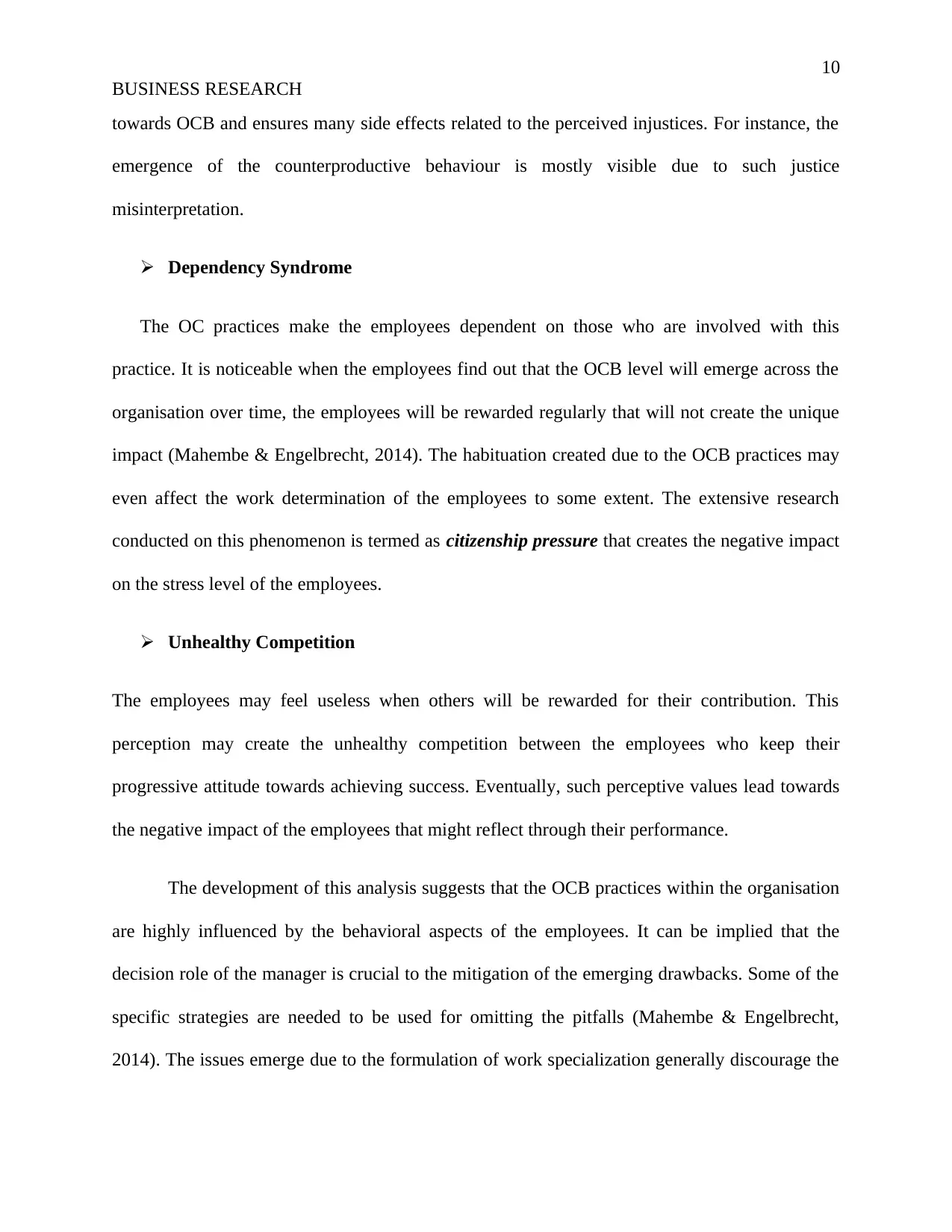
10
BUSINESS RESEARCH
towards OCB and ensures many side effects related to the perceived injustices. For instance, the
emergence of the counterproductive behaviour is mostly visible due to such justice
misinterpretation.
Dependency Syndrome
The OC practices make the employees dependent on those who are involved with this
practice. It is noticeable when the employees find out that the OCB level will emerge across the
organisation over time, the employees will be rewarded regularly that will not create the unique
impact (Mahembe & Engelbrecht, 2014). The habituation created due to the OCB practices may
even affect the work determination of the employees to some extent. The extensive research
conducted on this phenomenon is termed as citizenship pressure that creates the negative impact
on the stress level of the employees.
Unhealthy Competition
The employees may feel useless when others will be rewarded for their contribution. This
perception may create the unhealthy competition between the employees who keep their
progressive attitude towards achieving success. Eventually, such perceptive values lead towards
the negative impact of the employees that might reflect through their performance.
The development of this analysis suggests that the OCB practices within the organisation
are highly influenced by the behavioral aspects of the employees. It can be implied that the
decision role of the manager is crucial to the mitigation of the emerging drawbacks. Some of the
specific strategies are needed to be used for omitting the pitfalls (Mahembe & Engelbrecht,
2014). The issues emerge due to the formulation of work specialization generally discourage the
BUSINESS RESEARCH
towards OCB and ensures many side effects related to the perceived injustices. For instance, the
emergence of the counterproductive behaviour is mostly visible due to such justice
misinterpretation.
Dependency Syndrome
The OC practices make the employees dependent on those who are involved with this
practice. It is noticeable when the employees find out that the OCB level will emerge across the
organisation over time, the employees will be rewarded regularly that will not create the unique
impact (Mahembe & Engelbrecht, 2014). The habituation created due to the OCB practices may
even affect the work determination of the employees to some extent. The extensive research
conducted on this phenomenon is termed as citizenship pressure that creates the negative impact
on the stress level of the employees.
Unhealthy Competition
The employees may feel useless when others will be rewarded for their contribution. This
perception may create the unhealthy competition between the employees who keep their
progressive attitude towards achieving success. Eventually, such perceptive values lead towards
the negative impact of the employees that might reflect through their performance.
The development of this analysis suggests that the OCB practices within the organisation
are highly influenced by the behavioral aspects of the employees. It can be implied that the
decision role of the manager is crucial to the mitigation of the emerging drawbacks. Some of the
specific strategies are needed to be used for omitting the pitfalls (Mahembe & Engelbrecht,
2014). The issues emerge due to the formulation of work specialization generally discourage the
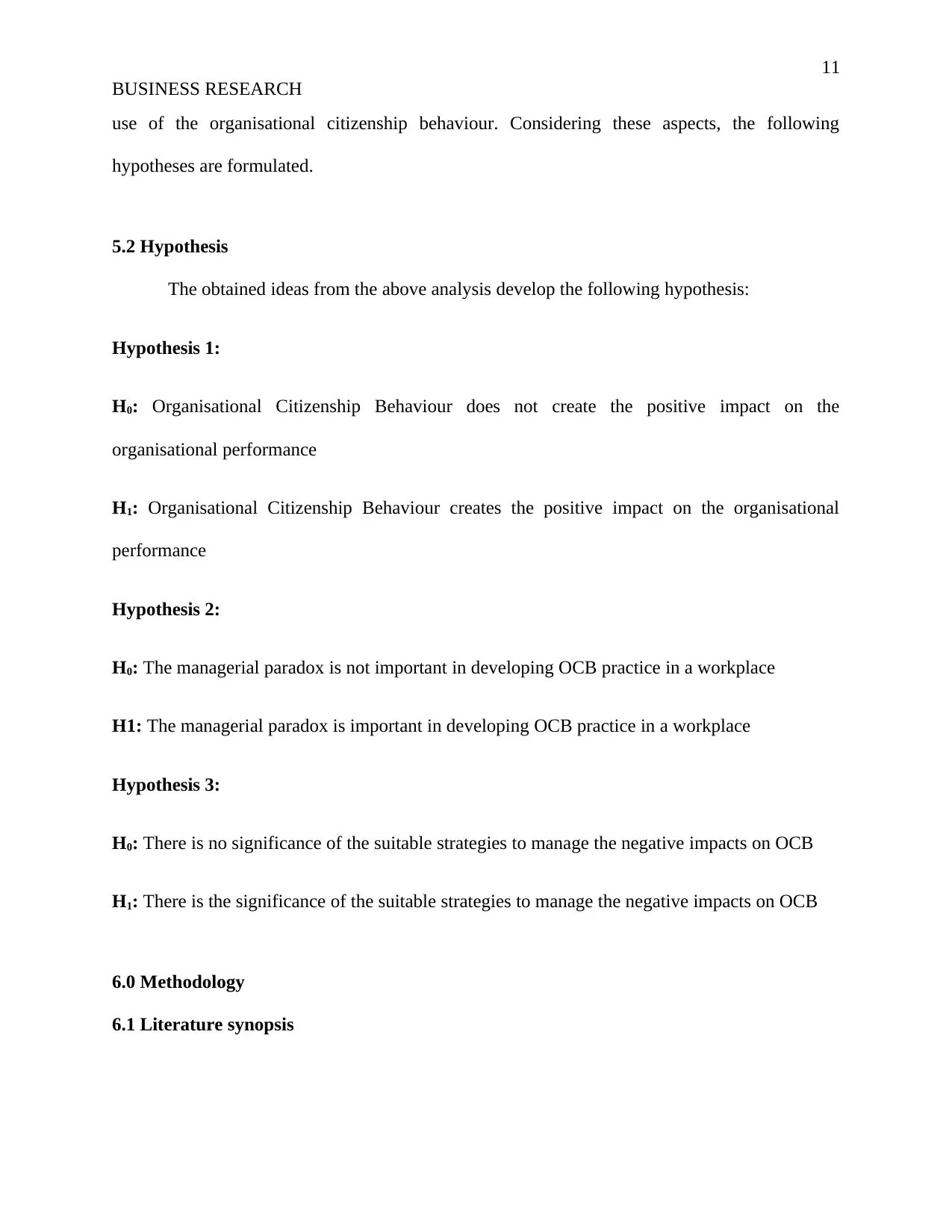
11
BUSINESS RESEARCH
use of the organisational citizenship behaviour. Considering these aspects, the following
hypotheses are formulated.
5.2 Hypothesis
The obtained ideas from the above analysis develop the following hypothesis:
Hypothesis 1:
H0: Organisational Citizenship Behaviour does not create the positive impact on the
organisational performance
H1: Organisational Citizenship Behaviour creates the positive impact on the organisational
performance
Hypothesis 2:
H0: The managerial paradox is not important in developing OCB practice in a workplace
H1: The managerial paradox is important in developing OCB practice in a workplace
Hypothesis 3:
H0: There is no significance of the suitable strategies to manage the negative impacts on OCB
H1: There is the significance of the suitable strategies to manage the negative impacts on OCB
6.0 Methodology
6.1 Literature synopsis
BUSINESS RESEARCH
use of the organisational citizenship behaviour. Considering these aspects, the following
hypotheses are formulated.
5.2 Hypothesis
The obtained ideas from the above analysis develop the following hypothesis:
Hypothesis 1:
H0: Organisational Citizenship Behaviour does not create the positive impact on the
organisational performance
H1: Organisational Citizenship Behaviour creates the positive impact on the organisational
performance
Hypothesis 2:
H0: The managerial paradox is not important in developing OCB practice in a workplace
H1: The managerial paradox is important in developing OCB practice in a workplace
Hypothesis 3:
H0: There is no significance of the suitable strategies to manage the negative impacts on OCB
H1: There is the significance of the suitable strategies to manage the negative impacts on OCB
6.0 Methodology
6.1 Literature synopsis
⊘ This is a preview!⊘
Do you want full access?
Subscribe today to unlock all pages.

Trusted by 1+ million students worldwide
1 out of 19
Related Documents
Your All-in-One AI-Powered Toolkit for Academic Success.
+13062052269
info@desklib.com
Available 24*7 on WhatsApp / Email
![[object Object]](/_next/static/media/star-bottom.7253800d.svg)
Unlock your academic potential
Copyright © 2020–2026 A2Z Services. All Rights Reserved. Developed and managed by ZUCOL.





